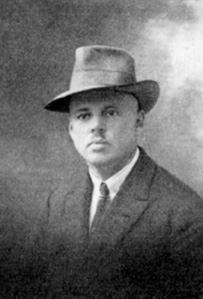The directory «Plots»
Kraigher Alojz
(1877—1959)

Alojz Kraigher, physician, writer, dramatist and publicist. Although Kraigher's professional interest was medicine (he enrolled in medicine in 1897 in Vienna and was awarded a doctor's degree in 1903), he devoted himself to literature. He started publishing his work as a grammar school student. He was a member of the Ljubljana students' literary society Zadruga, where he was accepted upon recommendation of his schoolmate, the poet D. Kette. In Vienna, he associated with other representatives of the Slovene moderna, O. Župančič and Ivan Cankar. His acquaintance with Cankar evolved into a lifelong friendship. Kraigher's first works were published under different pen names and it was only after 1911 that he started using his real name. His first dramatic piece, the one-act play Drama na travniku (‘A Meadow Drama’) was written in 1910 and was followed the next year by the naturalist farce Pustna noč (‘Carnival Night’) and his first three-act play Školjka (‘The Shell’) (staged in 1911 and 1917 in Zagreb and in 1920 in Maribor, rewritten in 1923).
From 1903, he practiced as a physician in Ljubljana , Bovec and Gradišče in Slovenske gorice, where he also started to be actively involved in politics and express his liberal views. In 1914, he returned to Ljubljana , where he was head of the city's hospital after the war. During that period he also wrote his first important prose piece, the novel Kontrolor Škrobar (‘Controller Škrobar’) (1914). In the same period, he was also a member of the theatre consortium and collaborated at the publishing house Slovenska matica and from 1919 to 1922, he was president of the Slovene Belletrist Society. In 1919, he supported the foundation of the Faculty of Medicine within the University of Ljubljana . It was in that period that he paid a tribute to the memory of his friend I. Cankar in the play Umetnikova trilogija (‘An Artist's Trilogy’) (1921). Later, he returned on the subject of Cankar with his discussion paper Cankarja zdravje, bolezen in smrt (‘The Health, Illness and Death of Ivan Cankar’) (1939) and in the monographic publication Ivan Cankar (1954, 1958). As head of the hospital, he had to retire from politics, thus he specialized in stomatology in Munich (1922-23) and practised as a dentist, first in Gorica, until the fascist regime made that impossible, and later in Ljubljana. During that time, he wrote the novel Mlada ljubezen (‘A Young Love’) (published by Ljubljanski zvon 1917-18, reprinted in 1923). In 1929, he wrote the somewhat autobiographical play, set in a hospital environment, Na fronti sestre Žive (‘At the Frontline of Nurse Živa’), which was staged in 1930. In the same year, he joined the left-wing intelligentsia and stood as a candidate for the Slovene joint opposition in 1938. During the occupation, he collaborated with the Osvobodilna Fronta (the Slovene Liberation Front) and in 1943, he was captured by Hitler's army and deported to the Dachau concentration camp in 1944. In 1945, after the liberation, he was conferred the title of honorary professor at the Faculty of Medicine in Ljubljana. Up until 1949, he was head of the Central Medical Library and editor of the medical journal Zdravstveni vestnik from 1946 to 1947. During that period, he published a collection of some of his most significant early works, mostly revised, under the title Novele (‘Short Stories’) (1946). A short autobiographical prose work, dealing with the subject of war and his experience in a concentration camp, which he wrote after 1945, was published after his death with the title Na robu življenja (‘On the Edge of Life’) (1961).
Yugoslavia, 1977, Alojz Kraigher